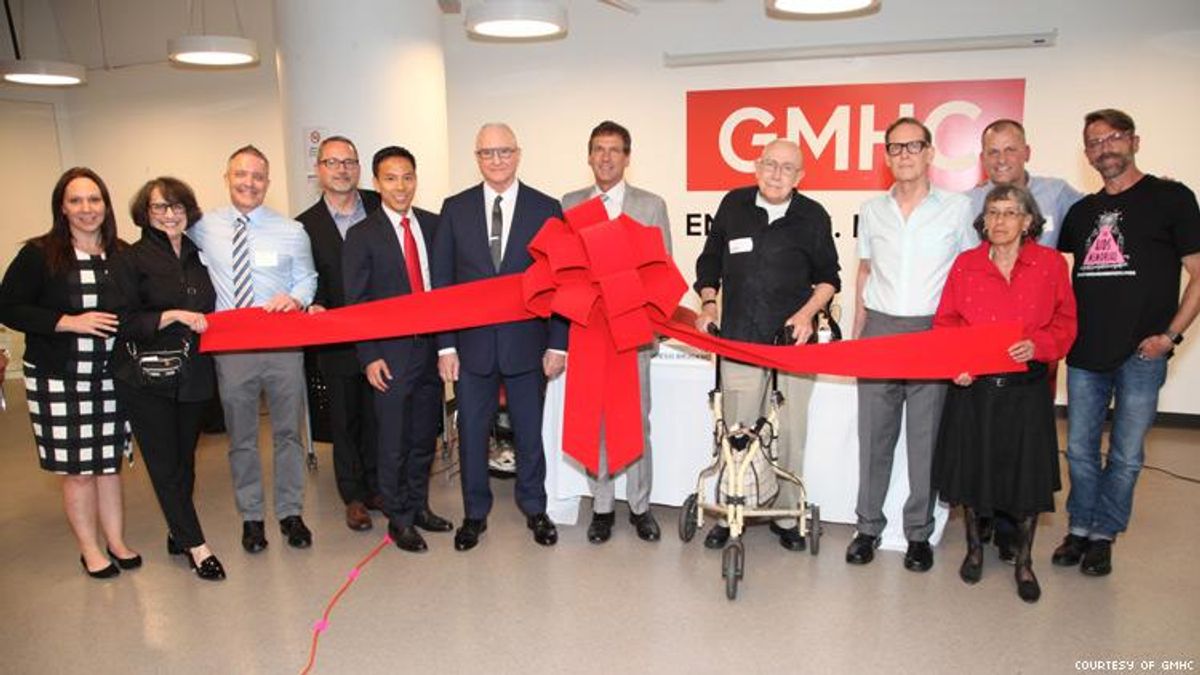The Terry Brenneis Hub for Long-Term Survivors at Gay Men’s Health Crisis (GMHC) is a program to support people who identify as long-term HIV survivors in their efforts to lead healthy and rewarding lives.
Gregg Bruckno, GMHC’s Long-Term Survivor Specialist says, "We’ve always worked with the long-term survivor community – even before the term 'long-term survivor' was coined – but, through the Hub, we’re now codifying our work with these folks and giving them a central contact at the agency. I work as the dedicated Long-Term Survivor Specialist, and it’s my job to connect self-identified long-term survivors to resources at GMHC and elsewhere. I also conduct forums and workshops on topics important to long-term survivors; participate in coalitions to promote information-sharing; and advocate for the long-term survivor community."
 From left to right: GMHC CEO Kelsey Louie, GMHC former Board Member David Boger, GMHC Long-Term Survival Specialist Gregg Bruckno (note: Terry Brenneis, after whom the Hub for Long-Term Survivors is named, is David Boger’s later partner).
From left to right: GMHC CEO Kelsey Louie, GMHC former Board Member David Boger, GMHC Long-Term Survival Specialist Gregg Bruckno (note: Terry Brenneis, after whom the Hub for Long-Term Survivors is named, is David Boger’s later partner).
Bruckno explains how they seamlessly connected the dots for services by explaining that "We like to say at GMHC is that we evolve with the epidemic. Starting in the mid-2000s, studies began to show that, because of incredible advances in medication, there was a fast-growing population of people who were living much longer with HIV – way beyond what many people expected. That was amazing news, of course, but it also presented a host of new challenges for those folks, as well as for organizations providing services to them."
Having worked with the long-term survivor community for many years, GMHC realized they had unique needs that were different from newly diagnosed people – especially if they lived through the worst of the plague years and lost much of their support system. "So as we considered all of this and looked at our program offerings, it became clear that we needed two things: staff who were dedicated to working with long-term survivors, and programs designed specifically for them."
Bruckno addresses what sometimes appears to be a cause at odds — a culture that seems to value prevention (PrEP) and sometimes sort of overlooks long-term survivors — how do you reach a balance between prevention and treatment efforts into a cohesive program?
"At GMHC, we serve anyone who is living with or at risk of HIV infection. Full stop. That means we work with young men who have sex with men (MSM) of color, transgender people, women, older MSM, and everyone in between. But we also use data to tell us the populations that require special attention, and the data tell us that, in addition to targeting younger people with PrEP and other prevention tools, long-term survivors need our help. Our work isn’t a zero-sum game, and, luckily, we have the resources necessary to work across populations."
According to Bruckno about 41 percent of their 13,000 clients are age 50 and older – and they estimate that about half of them are long-term survivors. As HIV and AIDS in the United States continues to evolve, long-term survivors are gradually becoming one of the key new populations of the epidemic. "So while we want to prevent new infections in communities that are most at risk, we also want to ensure that long-term survivors have the tools and support network to help them stay on medication and lead healthy lives. Through our work with the Hub and publicizing our efforts, we hope that more people will understand that, while of course we should value prevention tools, we also need to take care of those who are living with HIV."
Some of the services offered by the Hub that address the needs of long-term survivors include:
1. Dedicated long-term survivor support groups and one-on-one mental health and substance use counseling.
2 .The Buddy Program, one of GMHC’s original programs, which was relaunched in 2015 specifically for the long-term survivor community.
3. Social events and related workshops.
4. Meals and nutritional counseling.
5. Workforce placement and job readiness services.
6. Assistance with managing healthcare benefits and social security-related issues.
7. On-site pharmacy and medication management.
8. Multiple wellness programs including chair yoga, acupuncture, and massage.
The Hub was named after Mr. Brenneis, because Bruckner says, "Terry was a long-term survivor who at times struggled with the problems prevalent in this population: depression, loneliness, substance use and lipodystrophy. He was emblematic of the difficulties in managing this complex ride. He struggled and overcame a great deal with the support of family, friends and doctors. But we lost him far too early. He now will be remembered as part of a movement he would be so proud to represent."
Gay Men's Health Crisis (GMHC) is the world's first HIV/AIDS service organization. GMHC is on the front lines providing services to over 13,000 people living with and affected by HIV/AIDS. Programs include: testing, prevention, nutrition, legal, supportive housing, mental health and substance use services. GMHC also advocates for stronger public policies at the local, state and federal levels with the goal of ending AIDS as an epidemic. For more information, visit: www.gmhc.org.

 From left to right: GMHC CEO Kelsey Louie, GMHC former Board Member David Boger, GMHC Long-Term Survival Specialist Gregg Bruckno (note: Terry Brenneis, after whom the Hub for Long-Term Survivors is named, is David Boger’s later partner).
From left to right: GMHC CEO Kelsey Louie, GMHC former Board Member David Boger, GMHC Long-Term Survival Specialist Gregg Bruckno (note: Terry Brenneis, after whom the Hub for Long-Term Survivors is named, is David Boger’s later partner).














































































